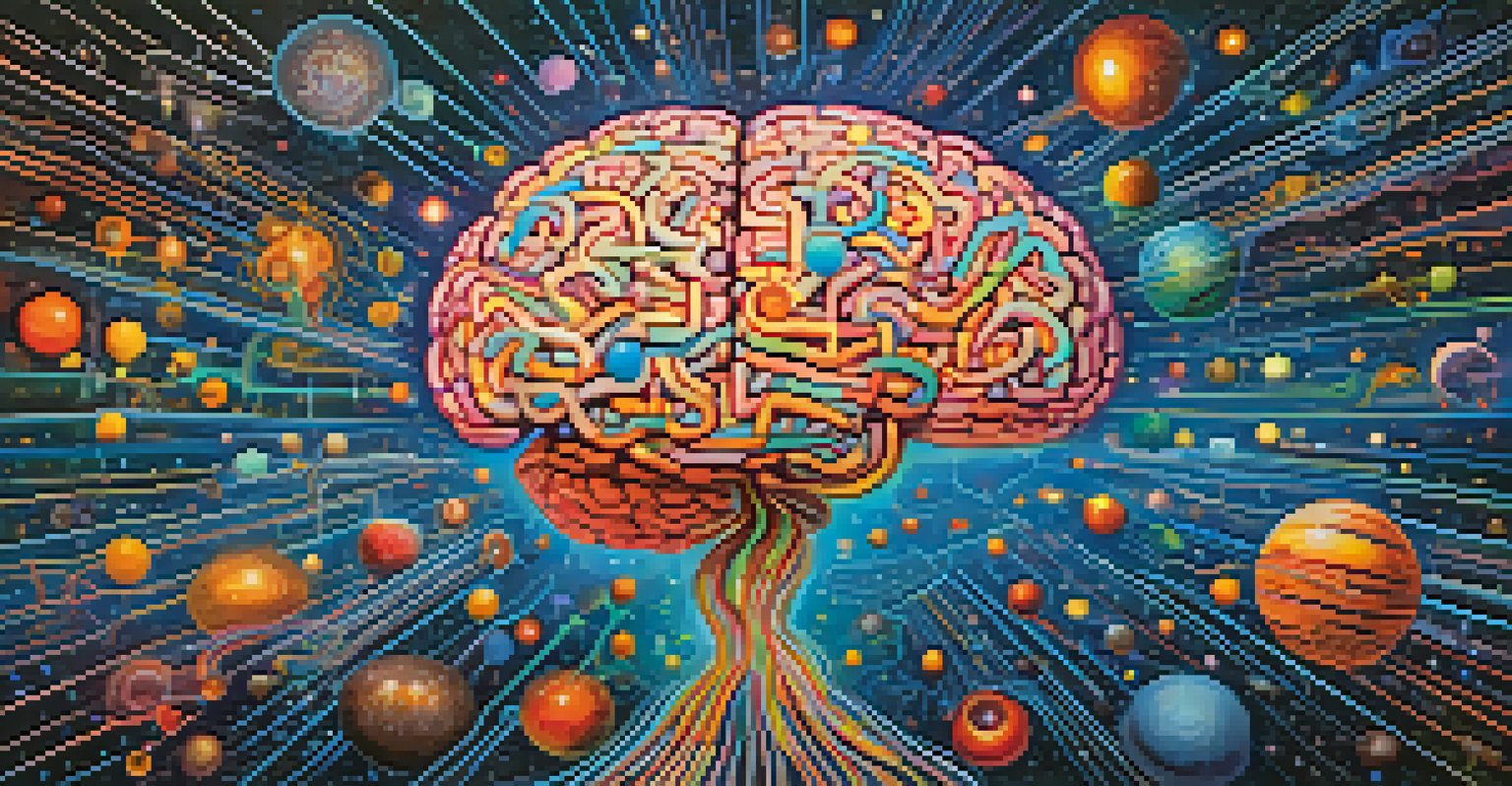Entheogens, Mental Health, and Legal Implications Explored

Understanding Entheogens: Nature's Psychedelic Tools
Entheogens are substances derived from plants or fungi that induce altered states of consciousness, often used in spiritual or therapeutic settings. These natural compounds, such as psilocybin in mushrooms and ayahuasca, have been utilized for centuries by various cultures. Their ability to facilitate profound psychological experiences is what sets them apart from traditional psychoactive substances.
The use of psychedelics in therapy is a powerful tool for self-discovery and healing.
Recent studies have reignited interest in the potential therapeutic benefits of entheogens, particularly for mental health conditions like depression, PTSD, and anxiety. For example, research has shown that psilocybin can help patients with treatment-resistant depression experience significant relief. This shift in perception is crucial as society begins to reconsider the role of these substances in mental wellness.
However, the conversation surrounding entheogens is complex, intertwining culture, spirituality, and science. As we explore their uses, we must also consider the ethical implications of their consumption and the need for responsible integration into modern therapeutic practices.
Mental Health Benefits: Can Entheogens Be the Answer?
The potential of entheogens in treating mental health issues is not just theoretical; a growing body of evidence supports their efficacy. For instance, clinical trials have demonstrated that psychedelics can lead to lasting changes in mood and perception, offering hope for those who have tried conventional treatments without success. This discovery is particularly promising for veterans suffering from PTSD.

Moreover, the experience of using entheogens can often lead to profound personal insights and emotional breakthroughs. Many users describe feelings of interconnectedness and enhanced empathy, which can shift one’s perspective on life. These experiences may help break patterns of negative thinking and foster a deeper understanding of oneself.
Entheogens Aid Mental Health Treatment
Research shows that entheogens like psilocybin can help treat conditions such as depression and PTSD, offering new hope for patients.
While the potential benefits of entheogens are exciting, it's essential to approach their use with caution. Professional guidance and controlled environments can significantly enhance safety and efficacy, ensuring that individuals receive the full therapeutic benefits without adverse effects.
Legal Landscape: The Current State of Entheogen Regulation
The legal status of entheogens varies widely across the globe, reflecting cultural attitudes and historical contexts. In some countries, substances like psilocybin and ayahuasca are legal for therapeutic or religious use, while in others, they remain strictly prohibited. This patchwork of regulations can create confusion and hinder access to potentially life-changing therapies.
Entheogens are not just substances; they are a bridge to understanding the human experience and our connection to the universe.
In recent years, there has been a growing movement to decriminalize or legalize certain entheogens, driven by their promising therapeutic potential. Cities like Denver and Oakland have taken steps to decriminalize psilocybin, allowing for more extensive research and community use. These changes signal a shift in public perception and a potential re-evaluation of drug policies surrounding psychedelics.
However, legal reform is often slow and fraught with challenges, including stigma and misinformation. Advocacy efforts are crucial in educating policymakers and the public about the benefits of responsible entheogen use, ensuring that legislation reflects current scientific understanding and societal needs.
The Role of Research: Uncovering the Science Behind Entheogens
Scientific research into entheogens has gained momentum, shedding light on their effects and potential therapeutic applications. Institutions like Johns Hopkins University have established dedicated centers for psychedelic research, focusing on the impact of substances like psilocybin on mental health. This rigorous scientific approach is vital for dispelling myths and building a solid evidence base.
Research findings suggest that entheogens can induce neuroplasticity, the brain's ability to reorganize itself by forming new connections. This property is particularly valuable in treating conditions like addiction and depression, as it may help patients develop healthier coping mechanisms. The science behind these substances reveals that they can be more than just recreational drugs; they may offer real solutions to complex mental health challenges.
Legal Status Influences Access
The varying legal status of entheogens around the world affects access to their potential therapeutic benefits and research opportunities.
As research evolves, it is essential to maintain an open dialogue about the implications of using entheogens in therapeutic settings. Ethical considerations, such as informed consent and the importance of integration therapy, must be prioritized to ensure the safety and well-being of individuals seeking help.
Cultural Significance: Entheogens and Indigenous Practices
Entheogens hold deep cultural significance for many Indigenous peoples, who have used these substances for spiritual and healing purposes for centuries. Practices involving substances like peyote and ayahuasca are woven into the fabric of their communities, highlighting the sacred relationship between humans and nature. This cultural heritage offers valuable insights into the respectful use and understanding of entheogens.
However, the growing interest in entheogens raises concerns about cultural appropriation and the commodification of Indigenous practices. It's crucial to honor the traditions and knowledge of Indigenous peoples while fostering a dialogue about the ethical use of entheogens in modern contexts. Acknowledging these roots can enhance our appreciation for the complexity of these substances.
Incorporating Indigenous perspectives into the conversation about entheogens can lead to more respectful and informed practices. Collaborating with Indigenous leaders and communities can help ensure that their wisdom is recognized and that any benefits derived from entheogens are shared equitably and ethically.
Personal Experiences: The Power of Entheogenic Journeys
Many individuals who have explored entheogens report transformative experiences that have profoundly impacted their lives. These journeys often lead to enhanced self-awareness, emotional healing, and a renewed sense of purpose. For some, a single session can catalyze changes that were previously thought impossible, illustrating the power of these substances.
Personal anecdotes often highlight the sense of connectedness and unity with the universe that entheogens can evoke. People describe feelings of love and acceptance, which can be especially healing for those grappling with trauma or isolation. These experiences bridge the gap between mental health treatment and spiritual exploration, offering a holistic approach to healing.
Cultural Respect is Essential
Acknowledging the cultural significance of entheogens among Indigenous peoples is crucial for their ethical use and understanding in modern contexts.
However, it's important to note that not all experiences are positive; some individuals may encounter challenging emotions or realizations. This underscores the necessity of having proper guidance and support during entheogenic journeys, ensuring that individuals can navigate their experiences safely and constructively.
Future Directions: The Path Forward for Entheogens and Mental Health
The future of entheogens in mental health care looks promising, with increasing acceptance and research paving the way for new treatment modalities. As more clinical trials are conducted and positive outcomes documented, we may see a shift in how mental health is approached, integrating these substances into mainstream therapy. This could lead to a broader acceptance of alternative healing practices.
Moreover, the potential for entheogens to foster community and connection cannot be overlooked. As society grapples with rising mental health issues, these substances may offer a unique avenue for collective healing, bringing people together in shared experiences. This aspect is crucial in a world often marked by isolation and disconnection.

Ultimately, the journey towards integrating entheogens into mental health care must be guided by compassion, respect, and a commitment to ethical practices. By prioritizing research, education, and community involvement, we can create a future where entheogens serve as valuable tools for healing and personal growth.